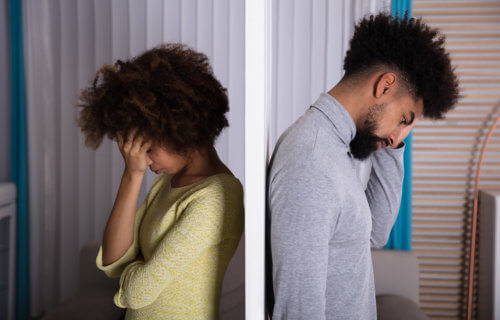MORGANTOWN, W. Va. — For couples during the coronavirus pandemic, all that quality time at home together could seem like a blessing — at first. Unfortunately, the charm of working from home can quickly wear off when spouses start stepping on each other’s toes. A new study finds the more a person feels their spouse is throwing off their normal routine, the more they tend to believe their relationship is in trouble.
Researchers from West Virginia University say there have been no shortages of challenges facing couples during COVID lockdowns. Part of that includes spouses adjusting to remote work schedules which overlap with their significant other’s. The study finds these scheduling conflicts can make some Americans wonder, “what makes his/her job more important than mine!”
Study authors looked at 165 married individuals, examining how they felt their partners interfered with their daily lives during April of 2020 — the first month of the pandemic.
“When you are impeding your significant other from accomplishing their goals or are disrupting their daily routines, there will be emotional responses,” Kevin Knoster, a third-year doctoral student in the Department of Communication Studies, says in a university release. “Based on our findings, more interference from your spouse leads to sadness and anger, and that’s independent from one another. This can lead to perceptions of a turbulent relationship.”
COVID-19 lockdowns put couples in ‘a state of a flux’
Knoster and fellow doctoral student Heath Howard noted how they are both married and living with their spouses in Morgantown. This motivated them to explore COVID’s impact on relational turbulence theory. The theory contends that periods of instability or other changes can create ripples in a relationship. Previous studies have examined this problem in military spouses and older couples who are now “empty nesters.”
Quarantines, business shutdowns, and full citywide lockdowns presented a unique opportunity for the WVU team to research relational turbulence theory.
“Like a lot of people, we, too, had to adapt on the fly all of a sudden to working from home,” Knoster explains. “Our routines were in a state of a flux.”
Participants ranged in age from 18 to 74 years-old. Among the married volunteers with adult children, 64 had a child move back home during COVID. Researchers measured each person’s level of agreement with statements like “my spouse interferes with the plans that I make.”
Study authors also looked at how respondents finished sentences like “during the past month of the COVID-19 pandemic, when I have interacted with my spouse, I have felt…”
The results reveal husbands and wives who feel their everyday routines get disrupted by their spouse begin to develop negative feelings toward them. They also perceive their marriage to be more turbulent than others.
Making life at home better for both spouses
Knoster says he saw these disruptions in his own marriage after shifting to remote work.
“I step on her toes every now and then,” the researcher says. “I teach classes from home (on the computer) and her office is through a closed door behind me. If she needs to go to the restroom, she has to walk behind me so she may be thinking, ‘Do I need to coordinate with his schedule just to wash my hands?’ It’s interesting. It’s changed our professional lives and personal lives in more ways than we think.”
Study authors say couples who strategize their daily interactions and remain mindful of each other’s schedules see these negative emotions drift away quickly.
“Maybe my wife has a meeting that overlaps with my workout time,” Knoster adds. “I could decide to go ahead and pick up weights and drop them or I can adapt my routine. In contrast, maybe my wife doesn’t care about my fitness goals. If you’re getting in their way or have a ‘my way or the highway’ attitude, well, that’s going to facilitate more negative emotional responses.”
“When you and your partner support each other’s goals and accommodate routines, that elicits positive emotional reactions. We need to remember to catch our breaths for a moment and work together. It’s more important now that we’re sort of sequestered inside at all hours of the day and starting to feel like rats in a cage,” the doctoral student concludes.
The study appears in the journal Communication Research Reports.
